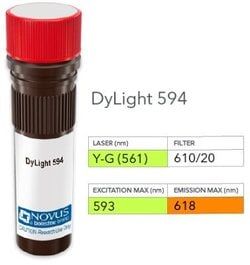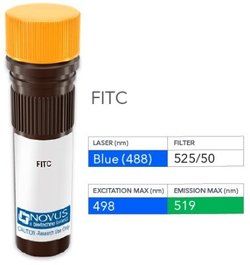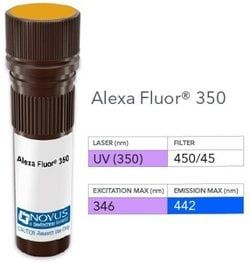ER alpha/NR3A1 Antibody (ER505), FITC, Novus Biologicals™
Manufacturer: Novus Biologicals
Select a Size
| Pack Size | SKU | Availability | Price |
|---|---|---|---|
| Each of 1 | NB005644-Each-of-1 | In Stock | ₹ 55,847.50 |
NB005644 - Each of 1
In Stock
Quantity
1
Base Price: ₹ 55,847.50
GST (18%): ₹ 10,052.55
Total Price: ₹ 65,900.05
Antigen
ER alpha/NR3A1
Classification
Monoclonal
Conjugate
FITC
Formulation
PBS with 0.05% Sodium Azide
Gene Symbols
ESR1
Immunogen
Recombinant human ER alpha/NR3A1 alpha protein (aa2-185) (Uniprot: P03372)
Quantity
0.1 mL
Research Discipline
Angiogenesis, Breast Cancer, Cancer, Cell Biology, Cell Cycle and Replication, Dendritic Cell Markers, GPCR, Neuroscience, Phospho Specific, Signal Transduction, Transcription Factors and Regulators
Test Specificity
This monoclonal antibody is specific to ER alpha and shows minimal cross-reaction with other members of the family. ER is an important regulator of growth and differentiation in the mammary gland. Presence of ER in breast tumors indicates an increased likelihood of response to anti-estrogen (e.g. tamoxifen) therapy. This monoclonal antibody is excellent for staining of formalin-fixed, paraffin-embedded breast carcinomas.
Content And Storage
Store at 4°C in the dark.
Applications
Flow Cytometry, ELISA, Immunohistochemistry, Immunohistochemistry (Paraffin), Immunohistochemistry (Frozen)
Clone
ER505
Dilution
Flow Cytometry, ELISA, Immunohistochemistry, Immunohistochemistry-Paraffin, Immunohistochemistry-Frozen
Gene Alias
ER, ER alpha, Era, ER-alpha, ESRESRA, Estradiol receptor, estrogen receptor, estrogen receptor 1, estrogen receptor alpha, estrogen receptor alpha delta 3*4,56,7*/819-2 isoform, estrogen receptor alpha delta 4 +49 isoform, estrogen receptor alpha delta 4*5,6,7*/654 isoform, NR3A1DKFZp686N23123, Nuclear receptor subfamily 3 group A member 1
Host Species
Mouse
Purification Method
Protein A or G purified
Regulatory Status
RUO
Primary or Secondary
Primary
Target Species
Human
Isotype
IgG1 κ
Related Products
Description
- ER alpha/NR3A1 Monoclonal specifically detects ER alpha/NR3A1 in Human samples
- It is validated for Immunohistochemistry, Immunohistochemistry-Paraffin, Flow (Intracellular).



